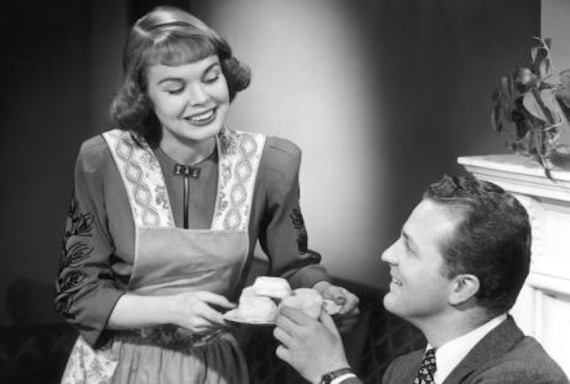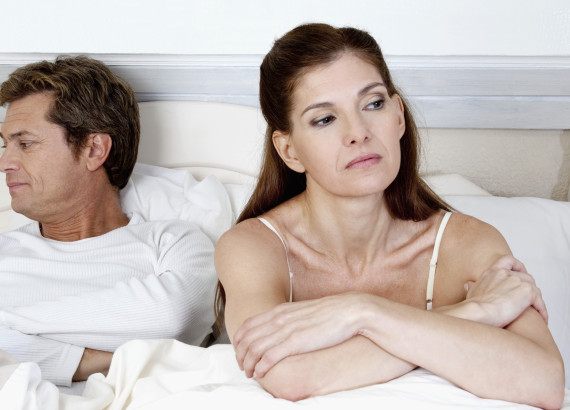Myth 1: Women are best suited to sexual monogamy.

Image: George Marks/Retrofile/Getty
In What Do Women Want? Adventures in the Science of Female Desire Daniel Bergner writes, "One of our most comforting assumptions; that female eros is much better made for monogamy than the male libido, is scarcely more than a fairy tale,'' and that "it's almost comical'' how long this myth has been mistaken for law.
Bergner cites a German study from 2006 that surveyed 2,500 couples and determined that women become sexually bored in monogamous relationships sooner than men do. A Canadian study from 2012 confirmed that female desire nose-dives during long-term relationships, while male desire does not show a similar decrease. Monogamy's no easy feat, even for the ladies.
Myth 2: Women don't crave sex as much as men do.

Image: Bernardino Licinio, "Young Lady and her Suitor"
Myth 2: Women don't crave sex as much as men do.

Image: Bernardino Licinio, "Young Lady and her Suitor"
Typically, men are assumed to have higher libidos than women. But according to Bergner, women are actually just as into sex as men, more "fluid" in their sexual attractions and possibly even more biologically programmed to seek sex with many different partners. Unfortunately, romantic conventions tell women to passively await male sexual advances, while society at large slut-shames women whom are deemed "too sexual." These kinds of pressures inhibit women from pursuing sex as freely as men do.
Myth 3: Women aren't as "visually" stimulated as men.
Myth 3: Women aren't as "visually" stimulated as men.

Image: Jonya via Getty
Women actually might be more turned on by visual stimuli than men, they're just less likely to talk about it. Meredith Chivers, a researcher and professor at Queen's University, researched men and women's responses to erotic material, and found thatwomen respond physically to a wider range of erotic imagery. Though women typically rank their enjoyment of pornography lower than men do in research studies,their brainwave activity is just as responsive.
Myth 4. Women take much longer to become sexually aroused.
Myth 4. Women take much longer to become sexually aroused.

Image: Jean-Honore Fragonard, "The Stolen Kiss"
Men require approximately 90 seconds of foreplay, while women need a good, long while to become aroused, right?
Not according to researchers at McGill University, who were surprised to discover that men and women experience sexual arousal at approximately the same rate, with both sexes taking about 10 minutes to become fully aroused while watching pornography. Though physical arousal doesn't always correlate to emotional desire to have sex, these findings do disprove the common myth that women require more time to become aroused. Similarly, it's assumed that women physically require much longer to reach orgasm than men do. Also false: Women, on average, take the sameamount of time to orgasm from masturbation as men do. Women do, however, take longer to orgasm during sexual encounters with men. That gap may simply come from our culture's prioritizing of sexual acts that make men orgasm, like vaginal sex.
Myth 5: Women's libidos and sexual enjoyment decrease with age.
Myth 5: Women's libidos and sexual enjoyment decrease with age.

Image: Glow Images, Inc via Getty
There's nothing more cliche than the sexually-disinterested 40-something TV wife. Yet, it's mere myth: According to research done by University of Texas psychologist David Buss, women in their 30s and 40s actually have higher sex drives than teenage girls and women in their 20's. What's more, women in their 40s also experience more powerful orgasms and are more likely to be multi-orgasmic, according to a Harvard Health Report. Relationship psychologist Susan Quilliam, co-author of The New Joy of Sex told The Guardian, "There's plenty of research that shows sex gets better for women as they get older. It's one of the best-kept secrets of women's lives."
Myth 6: Orgasms make women fall in love; it's hormonal.
Myth 6: Orgasms make women fall in love; it's hormonal.

Image: Orlando/Three Lions/Getty
The conventional wisdom holds that men can have orgasm-worthy, yet totally meaningless sex, while women have a hormonal response to orgasms that makes them fall in love and cuddle.
But Barry Komisaruk, professor of psychology at Rutgers University told Salon that, while orgasming does cause both men and women to release the so-called "love hormone" oxytocin, there isn't any evidence that the hormone actually makes anybody fall in love. Komisaruk says that, while more research need to be done, current findings suggest that orgasming has a similar affect on men and women. This calls for some equal opportunity cuddling!
No comments:
Post a Comment